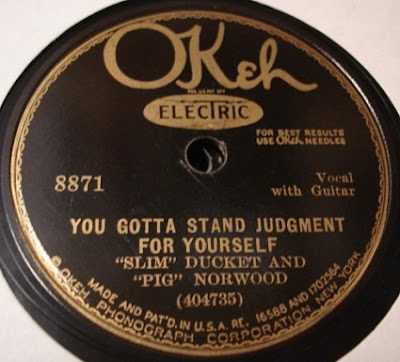Lonesome Valley, a spiritual from both white and black sources, was recorded by the Carter Family in 1930. A.P. Carter probably learned the song from Leslie Riddle , but popular versions by both Vernon Dalhart and Andy Jenkins had been circulating.
The earliest recording of "That Lonesome Valley" was done in 1925 by the Jenkins Family (although there seems to be an unreleased 1924 recording by David Miller --> see further on in this post).
The song has been recorded by many predominently country artists with varying lyrics and under numerous titles, including "Lonesome Valley","I've Got To Walk The Lonesome Valley", "That Lonesome Valley", "Walk That Lonesome Valley", "Jesus Walked The Lonesome Valley", "You Got To Walk That Lonesome Valley", "Everybody Got To Walk This Lonesome Valley" and "John The Baptist".
The song was contained in John Wesley Work's "Folk Song Of The American Negro" (1907).
Here a scan from the 1915 edition
First recording I could find;
(o) Jenkins Family (1925) (as "That Lonesome Valley")
Andrew Jenkins [vcl/gt], Irene Spain [vcl/organ/piano], Mary Lee Spain [vcl]
Recorded April 1925 in Atlanta, GA
Released on Okeh 40377
The Jenkins Family* - There Shall Be Showers Of Blessing / That Lonesome Valley (Shellac) at Discogs
http://en.wikipedia.org/wiki/Andrew_Jenkins
Listen to a sample here:
(c) Al Craver (=Vernon Dalhart) (1926) (as "John The Baptist")
Vernon Dalhart, v; acc. poss. John Cali, lute.
Recorded June 25, 1926 in New York
Released on Columbia 15086-D
Listen here:
(c) Pace Jubilee Singers (1926) (as "Everybody Got To Walk This Lonesome Valley")
Recorded September 13, 1926 in the Webster Hotel in Chicago, IL.
Released on Victor 20310
Listen here:
(c) Lester McFarland and Robert A. Gardner (1926) (as "The Lonesome Valley")
Recorded October 16, 1926 in New York
Released on Vocalion 5127
(c) Elzie Floyd and Leo Boswell 1927 (as "Lonesome Valley")
Recorded March 26, 1927 in Atlanta, GA
Released on Columbia 15167-D
Listen here:
On December 16, 1924 David Miller probably recorded the first version of "Lonesome Valley" in Cincinnati, Ohio.
This Gennett matix # 12104 stayed unissued. More than 2 years later, Miller made a new recording, which was released on ao the Gennett-label
(c) David Miller 1927 (as "The Lonesome Valley")
Recorded May 1927 in Richmond, IN.
Released on Gennett 6175, Champion 15317, Challenge 327, Herwin 75557
Challenge 327 as by
Dan Kutter and Herwin 75557 as by Oran Campbell.
Listen here:
(c) Rev F.W. McGee (1927) (as "You Got To Walk That Lonesome Valley")
Recorded June 7, 1927 in Chicago, Il
Released on Victor 20858
Listen here:
(c) Carter Family (1930) (as "Lonesome Valley")
Sara Carter [vcl/autoharp], A.P. Carter [vcl], Maybelle Carter [vcl/gt]
Recorded November 24, 1930 Memphis, TN
Released on Victor 23541, Bluebird B-6117 and Montgomery Ward M-4735
Listen here:
(c) "Slim" Duckett and "Pig" Norwood (1930) (as "You Gotta Stand Judgment For Yourself")
Recorded December 16, 1930 in Jackson, MS
Released on Okeh 8871
Listen here:
(c) Jim Baird (=Bill Elliott) (1932) (as "Lonesome Valley")
Bill Elliott, v; acc. Bob Mitchell, o.
Recorded February 5, 1932 in Camden, NJ
Released on Victor 23658 and on Montgomery Ward M-4337
(c) Carolina Ramblers String Band (1932) (as "That Lonesome Valley")
Steve Ledford, f/v; poss. Taft Ledford, f or g; unknown, h; Daniel Nicholson, bj/v;
Audie Rodgers, g/v; George
Ledford, v.
Recorded February 17, 1932 in New York
Released on Banner 32474, Melotone M12428, Oriole 8148, Perfect 12818 and
Romeo 5148
Listen here:
(c) Monroe Brothers (1936) (as "You've Got To Walk That Lonesome Valley")
Bill Monroe, Charlie Monroe, v duet; acc. Bill Monroe, md; Charlie Monroe, g.
Recorded February 17, 1936 in Charlotte, NC
Released on Bluebird B-6477 and Montgomery Ward M-5026
Listen here:
(c) J.E. Mainer's Mountaineers (1936) (as "Walk That Lonesome Valley")
J.E. Mainer, f/v; Junior Misenheimer, bj; Harold Christy, g; Beacham Blackweller, g;
Wade Mainer, v; Zeke Morris, v.
Recorded June 15, 1936 in Charlotte, NC
Released on Bluebird B-6596 and Montgomery Ward M-7007
Listen here: cusb_bb_b6596_01_bs102604_01d.mp3
Or here:
(c) Dixie Reelers (1936) (as "Lonesome Valley – Part 2")
Ollie Bunn, v; Daddy John Love, v/g; Clarence Todd, v/g.
Recorded June 20, 1936 in Charlotte, NC
Released on Bluebird B-6713 and Montgomery Ward M-7099
Listen here: cusb_bb_b6713_01_bs102720_01d.mp3
Or here:
(c) Heavenly Gospel Singers (1937) (as "Walk This Lonesome Valley")
Recorded on February 16, 1937 in Charlotte, NC
Released on Bluebird B-6984
Listen here:
(c) Roy Acuff and His Smoky Mountain Boys (1937) (as "Lonesome Valley")
Roy Acuff, f/v/bj ; Clell Summey, sg/v; Jess Easterday, g; Red
Jones, sb/v.
Recorded March 22, 1937 in Birmingham, AL
Released on Vocalion/Okeh 04730 and on Conqueror 9256
Listen here:
(c) Woody Guthrie (1940) (as "Lonesome Valley")
Library Of Congress, Washington, DC sessions with Alan Lomax
Recorded March 21, 1940
Matrix 3416-B2
Released on the Elektra-box set Library of Congress Recordings.
Listen here:
(c) Elvis Presley & the Million Dollar Quartet (1956) (as "Jesus Walked That Lonesome Valley")
Elvis Presley [gt/piano], Jerry Lee Lewis [vcl/piano], Carl Perkins
[vcl/gt], Jay Perkins [gt],
Charlie Underwood [gt], Clayton Perkins
[bass], W.S. Holland [drums]
Recorded December 4, 1956 during an informal session in the Sun Studio in Memphis, TN
Listen here:
(c) Kitty Wells (1959) (as "Lonesome Valley")
Recorded October 30, 1958 in Nashville, TN
Released on Dust On The Bible.
Listen here:
(c) Little Richard (1959) (as "Jesus Walked This Lonesome Valley")
Listen here:
Billy Ed Wheeler,
(with Jed Peters (=Mike Stoller and Jerry Leiber) used “Lonesome Valley” as the core
of a song he called “Reverend Mr Black,” which was released by
the Kingston Trio in 1963 becoming a top ten hit on the Billboard that
year.
“Reverend Mr. Black” was also recorded by Bobby Darin (1963), Faron Young
(1963), and Johnny Cash (1981). Others who have recorded this song are
Tex Ritter, Lonnie Donegan, John Stewart, Tim Grimm, and Sherwin &
Pam Linton.
(c) Billy Ed Wheeler 1963 (as "Reverend Mr. Black")
Recorded October 8, 1963 Nashville, TN
Released on the album New Bag of Songs (Kapp KS-3351)
Billy Edd Wheeler's author's version was recorded and released after the hit-version by the Kingston Trio (who had used Billy Edd Wheeler's DEMO as a guide)
Listen here:
(c) Kingston Trio (1963) (as "Reverend Mr. Black")
John Stewart [vcl/gt/banjo], Nick Reynolds [vcl/gt], Bob Shane [vcl/gt] + Glen Campbell [banjo], Dean Reilly [bass]. Producer: Voyle Gilmore)
Recorded January 23, 1963 Capitol Recording Studio in Hollywood, CA
Released on Capitol 4951
Listen here:
(c) Johnny Cash & The Carter Family (1963) (as "Lonesome Valley")
Carter Family & Johnny Cash (Maybelle Carter [vcl], Helen Carter [vcl], Anita Carter [vcl], June Carter [vcl], Junior Huskey [bass], Bob Johnson. Producer: Don Law & Frank Jones) [overub session on September 4, 1963, Nashville, TN: Johnny Cash [vcl])
Recorded July 8, 1963 in the Columbia Recording Studio in Nashville, TN
Released in 1964 on the album Keep on the Sunny Side.
Listen here:
(c) Mississippi John Hurt (1965) (as "Lonesome Valley")
Mississippi John Hurt singing, "Lonesome Valley" on Pete Seeger's TV program, Rainbow Quest.
(c) Vince Martin and Fred Neil (1964) (as "Lonesome Valley")
Released on the album Tear Down The Walls.
Listen here:
(c) Kevin Coyne (1973) (as "Lonesome Valley")
Released on the abum Marjorie Razorblade.
Listen here:
(c) Bruce Springsteen (1993) (as "Lonesome Valley")
24-06-1993 East Rutherford, New Jersey
26-06-1993 New York City
Listen here to the live version from New York City 26/2/93
This version was released on Satan's Jewel Crown album
(c) Eric Bibb (1994) (as "Lonesome Valley")
On the album Spirits & The Blues.
Listen here:
(c) Fairfield Four (2000) (as "Lonesome Valley")
Performed in the movie O Brother Where Art Thou?
Baritone Vocals
–
James Hill (2)
Bass Vocals [First Lead And Bass]
–
Isaac Freeman
Lead Vocals [Second Lead]
–
Nathan Best
Lead Vocals [Utility Lead]
–
Joseph Rice, Robert Hamlett
Tenor Vocals
–
Wilson Waters
http://www.discogs.com/Various-O-Brother-Where-Art-Thou-Music-From-The-Motion-Picture/release/550712
Listen here:
In 1975 Pete Seeger mixed up the lyrics of "Lonesome Valley" with a few lines from "Rough And Rocky".
(c) Pete Seeger and Arlo Guthrie (1975) (as "Lonesome Valley")
Recorded live in the Music Hall, in Boston
Listen here:
Seeger already sang that mixed-up version with Joan Baez around 1962:
This version was released on the album Very Early Joan.
Listen here:
But already in 1944 Woody Guthrie had recorded a version of "Lonesome Valley" which included the "Rough And Rocky" verse. (So that's even before T. Texas Tyler recorded "Rough And Rocky" in 1945 !!!
Listen here:
More versions here:
And the melody also resembles the next songcluster:
"Little Bunch of Roses" (1928)
"Who's Gonna Kiss Your Lips, Dear Darling" (1929)
"Last Gold Dollar" (1929)
"Can't You Hear That Night Bird Crying" (1936)
"(Don't This Road Look) Rough And Rocky" (1945)










.jpg)

.jpg)
.jpg)





















